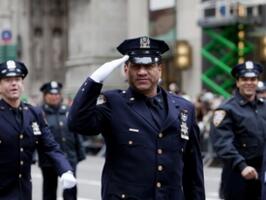Post-Charlotte, Voters Say Obama, Clinton on Side of Protestors, Trump With Police
Voters think President Obama and Hillary Clinton are more likely to side with the protestors in situations like the recent one in Charlotte, N.C., but strongly believe Donald Trump is on the side of the cops.
The latest Rasmussen Reports national telephone and online survey finds that 62% of Likely U.S. Voters think Trump, the Republican presidential nominee, identifies more with the police in situations like the one in Charlotte. Just eight percent (8%) say Trump is more in line with the protestors, while 21% say he sympathizes with both sides. (To see survey question wording, click here.)
But a plurality (47%) believes Clinton, his Democratic rival, identifies more with the protestors. Only nine percent (9%) feel Clinton sides more with the police, while 33% say she identifies with both sides.
As for the president, 46% think he identifies more with the protestors, seven percent (7%) with the police and 37% with both sides.
Last week’s protests in Charlotte followed the shooting by police of a black man. Similar protests and mob violence following police shootings has broken out in several cities over the past couple years. Sixty percent (60%) of voters think comments critical of the police made by some politicians make it more dangerous for police officers to do their job. Just 15% disagree and say it’s more likely that these critical comments improve the quality of the police’s performance.
(Want a free daily e-mail update? If it's in the news, it's in our polls). Rasmussen Reports updates are also available on Twitter or Facebook.
The survey of 1,000 Likely Voters was conducted on September 22 and 25, 2016 by Rasmussen Reports. The margin of sampling error is +/- 3 percentage points with a 95% level of confidence. Field work for all Rasmussen Reports surveys is conducted by Pulse Opinion Research, LLC. See methodology.
Sixty percent (60%) of voters think race relations have gotten worse since the election of the first black president in 2008. Just nine percent (9%) believe race relations are better now.
Most Republicans, Democrats and voters not affiliated with either major political party are in general agreement that Trump sides more with the police.
Over 70% of GOP voters and just over half of unaffiliateds feel Clinton and Obama side with the protestors. But Democrats disagree: 52% say Clinton identifies with both sides, and 58% say the same of Obama.
There’s no racial disagreement when it comes to Trump’s loyalty to the police. But blacks are more than twice as likely as whites and other minority voters to think Trump identifies with the protestors.
While whites and other minorities see Clinton and the president siding with the protestors, blacks are more likely to say the two of them identify with both sides.
Despite the continuing national debate over police conduct, only 14% of all Americans think most deaths that involve the police are the fault of the policeman. More than ever (72%) rate the performance of the police in the area where they live as good or excellent.
More Americans favor requiring police officers to wear body cameras while on duty but still tend to believe they will protect the cops more than those they deal with.
Blacks and whites, however, tend to sharply disagree on most questions about the police and the criminal justice system. While 55% of whites and 52% of other minority voters think there is a war on police, for example, only 31% of blacks agree.
But Americans also strongly believe the media is emphasizing shootings by police officers involving black suspects over ones in which whites are shot and that that media coverage is prompting attacks on police.
Most voters continue to view crime in inner cities as a bigger problem than police discrimination against minorities. But blacks are far more likely to say they are treated unfairly by the police.
Additional information from this survey and a full demographic breakdown are available to Platinum Members only.
Please sign up for the Rasmussen Reports daily e-mail update (it's free) or follow us on Twitter or Facebook. Let us keep you up to date with the latest public opinion news.
The survey of 1,000 Likely Voters was conducted on September 22 and 25, 2016 by Rasmussen Reports. The margin of sampling error is +/- 3 percentage points with a 95% level of confidence. Field work for all Rasmussen Reports surveys is conducted by Pulse Opinion Research, LLC. See methodology.
Rasmussen Reports is a media company specializing in the collection, publication and distribution of public opinion information.
We conduct public opinion polls on a variety of topics to inform our audience on events in the news and other topics of interest. To ensure editorial control and independence, we pay for the polls ourselves and generate revenue through the sale of subscriptions, sponsorships, and advertising. Nightly polling on politics, business and lifestyle topics provides the content to update the Rasmussen Reports web site many times each day. If it's in the news, it's in our polls. Additionally, the data drives a daily update newsletter and various media outlets across the country.
Some information, including the Rasmussen Reports daily Presidential Tracking Poll and commentaries are available for free to the general public. Subscriptions are available for $4.95 a month or 34.95 a year that provide subscribers with exclusive access to more than 20 stories per week on upcoming elections, consumer confidence, and issues that affect us all. For those who are really into the numbers, Platinum Members can review demographic crosstabs and a full history of our data.
To learn more about our methodology, click here.





